Contents
The grape variety Beauty was bred in 2004 by the breeder E.E. Pavlovsky as a result of crossing the Victoria variety and the European-Amur varieties of this culture. The new variety got its name for its attractive appearance and high taste. Below is a description of the Krasotka grape variety, photos, reviews of gardeners.
Characteristics of a variety
Variety Beauty corresponds to the following description:
- medium bush;
- large elongated clusters weighing from 0,5 to 1 kg;
- bisexual flowers;
- grape ripening period – from 105 to 115 days;
- berries are located freely on the bunch;
- fruit shape – ovoid-elongated;
- the color of the grapes is dark pink in the middle and purple at the tips;
- pleasant refreshing taste;
- the pulp of the Beauty variety has light nutmeg notes and vanilla flavor;
- sugar content – 15%.
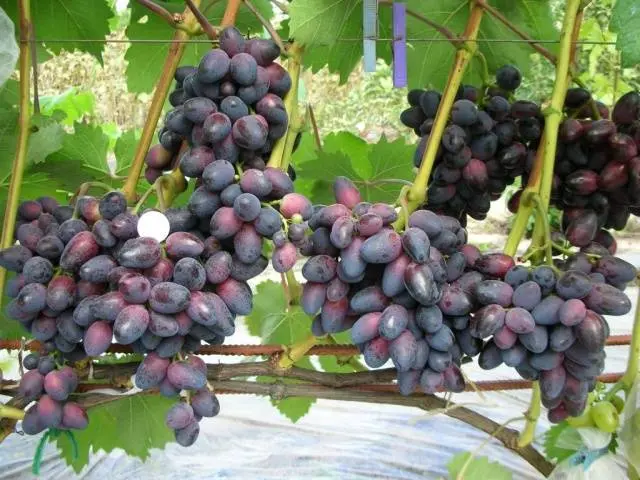
The Krasotka grape berry has an excellent presentation, the clusters are distinguished by good transportability. It is not recommended to keep the fruits on the bushes for too long, as the skin bursts and the flesh softens.
The variety does not have a high yield, but fruiting is stable. The root system of the plant is powerful, capable of providing the plant with nutrients. Seeds in fruits are rare, their number is no more than two.
Grape Beauty has the following benefits:
- resistance to sunlight (there are no burns on the berries);
- frost resistance up to -23 degrees;
- not exposed to gray rot and oidium;
- good resistance of the variety to anthracnose and mildew;
- attractive appearance;
- sweet taste;
- early stable harvest.
Description of the grape variety Beauty corresponds to the photo:
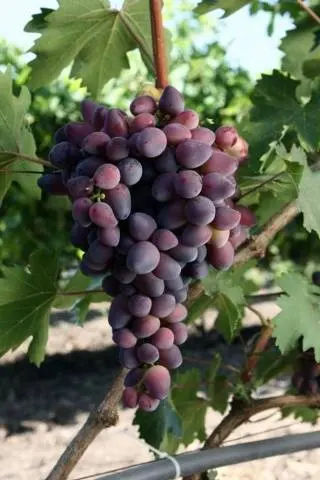
Landing order
The development of the Krasotka grape variety depends on the correct choice of location on the site. Before planting, it is important to prepare the soil. Be sure to apply fertilizers that promote the development of plants.
Site Selection
For planting grapes choose a sunny place, protected from the effects of the wind. It is best to locate the vineyard on the southern and southwestern slopes. The maximum allowable tilt is 25 degrees.
The soil should have medium acidity. Forest or chernozem soil is suitable for growing grapes. On light loam or loose soil with a high content of sand, it is much easier to care for the Beauty variety. The level of occurrence of groundwater is not less than 1,5 m from the surface.
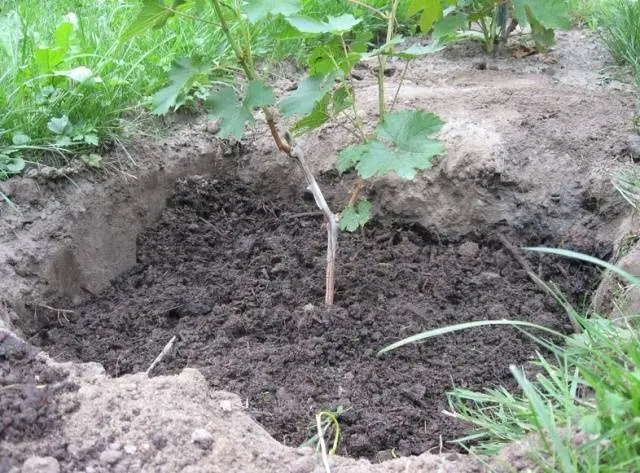
Soil preparation for planting begins 3 months before the start of work. First, the site is cleared of stones and plant debris (bark of trees, weeds, remnants of previous crops). The soil is dug up to a depth of 1 m.
In the recess, a drainage layer is made using crushed stone, sand and broken bricks. Then fertilizers are placed on its bottom: superphosphate (200 g), compost, manure, ammonium sulfate, ash. A layer of soil is placed on top. Horse and goat manure is added to heavy soils, while cow and pig manure is used for loamy soil.
If planting is planned in the spring, then the prepared pit is left for the winter. With autumn planting, work begins in mid-summer.
Features of landing
Grapes are recommended to be purchased in specialized centers. When choosing a seedling, you need to pay attention to its root system, which should include 2 or 3 white roots. The shoots must contain at least 3 blossoming leaves.
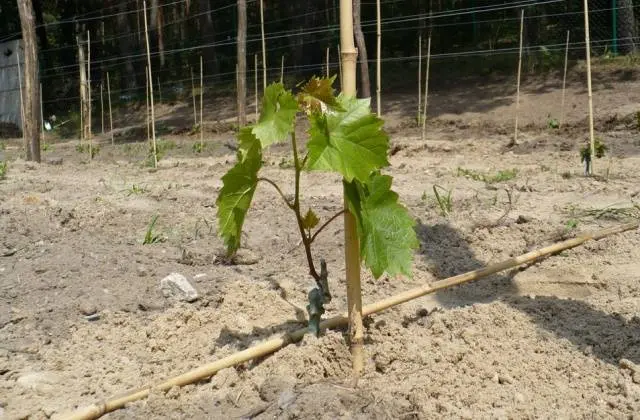
The annual seedling has an even and strong trunk. Its length is about 20 cm. The number of buds on the shoots is more than 6 pieces.
Grape cuttings are placed in a hole so that the root system is located at a distance of 0,5 m from the surface. The seedling is sprinkled with garden soil and tied to a support. Then pour 2 buckets of water under each bush. When the soil settles a little, the soil is mulched with straw or agrofibre.
Care instructions
Vineyard care includes a number of standard procedures: watering and fertilizing, pruning, protection from diseases and pests. Proper poly will help avoid fruit cracking. Top dressing will provide the vineyard with nutrients and improve the taste of the berries.
Watering the grapes
Special wells are prepared for watering the grapes. To do this, at a distance of 30 cm from the plant, a circle is drawn, in which several recesses are made. In the first year after planting, the grapes are watered once a week.
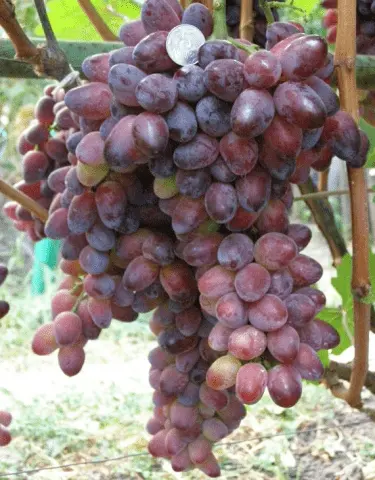
The main disadvantage of the Beauty variety is the cracking of the berries. This happens in sunny and rainy weather, with watering and its absence. To harvest before the berries crack, you need to minimally load the plant. Clusters are pruned immediately after ripening. If you postpone the procedure for a few days, you can lose part of the crop.
Regular watering, during which a small amount of moisture is introduced, helps to avoid cracking the berries. It is also necessary to spray the plantings with a solution of calcium nitrate.
Feeding
In the first year after planting, the Krasotka grape variety does not require top dressing. The plant will receive all the necessary substances from the fertilizers used during planting. The next year, in the spring, nitrogen-containing substances (50 g), superphosphate (40 g) and potassium (30 g) are added under each bush.
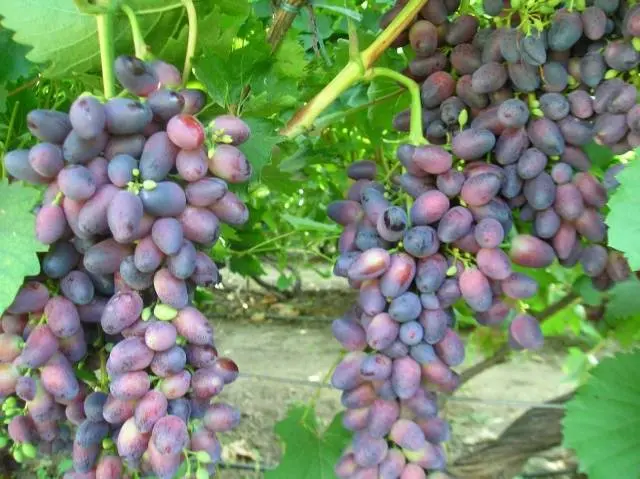
Before flowering, the dressing of the Beauty variety is repeated, however, the substances are dissolved in 2 buckets of slurry. Before use, the resulting mixture is diluted with water 1:5.
During the flowering period, the grapes are treated with a growth stimulator Gibberellin. This avoids cracking of berries and peas, as well as speeding up the ripening of the bunch.
Additional feeding will be required for the Beauty variety when the ovary appears. Substances with nitrogen, phosphorus and potassium will need 30 g each. They are diluted in 10 liters of water and applied by irrigation. A similar amount of substances, with the exception of nitrogen, is used at the stage of berry ripening. They are buried in the ground and the vineyard is watered.
Pruning and shelter
Grape variety Beauty is cut into 5-8 eyes. Grapes form powerful and long shoots. If you cut them too short, then part of the crop is lost and active growth of branches is provoked. In the spring, the load on the bush is additionally regulated.
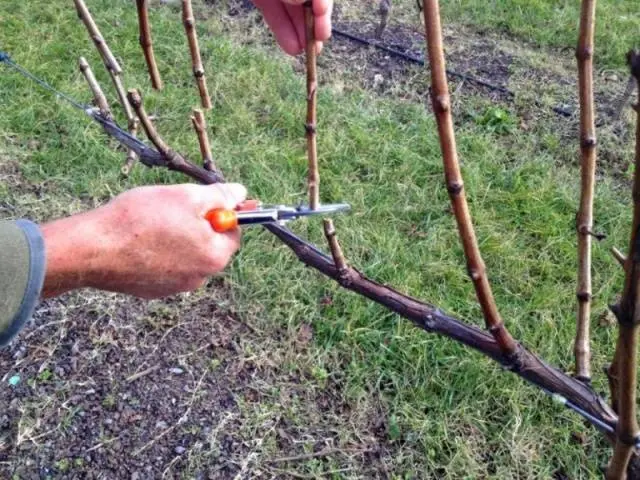
Before sheltering the grapes for the winter, cut off excess shoots and water the bushes abundantly (10 liters of water for each plant). The vine must be removed from the support and laid on the ground. Agrofilm is used as a covering material.
Protection against diseases and pests
Variety Beauty is resistant to the main diseases of the vineyard. For their prevention, it is recommended to treat plantings with complex preparations Acrobat, Quadris or Champion.
Weeds growing around the vineyard attract leafhoppers and other pests. Therefore, weed grass must be eliminated in time. Sweet berries attract birds, so it is recommended to cover bunches with gauze bags.
Another pest of the Beauty grape variety is wasps. They are able to gnaw through gauze, so a different method is used to deal with them. The grapes are sprayed with a solution consisting of mustard (200 g) and water (1 bucket). Mustard does not affect the taste of the fruit, and after harvesting it can be easily washed off.
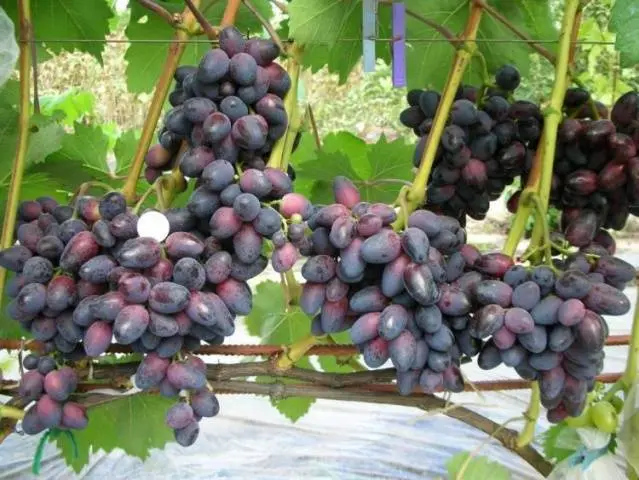
Reviews of gardeners
Conclusion
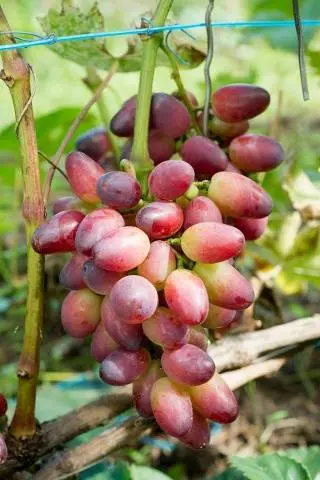
According to the photo and description of Krasotka grapes, the variety has excellent external characteristics and is suitable for further fresh sale. With proper care, you can avoid cracking berries and collect large harvests of grapes. Plantings need watering and regular feeding. For prevention, it is recommended to treat grapes with anti-disease agents.









